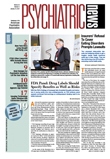Modern-day psychiatry undoubtedly has many “fathers” and“ mothers,” but one pioneering parent seems to have gone largely unrecognized.
The physician and philosopher Moses ben Maimon—known as Maimonides—was born around 1135 in Cordoba, Spain. At that time, Spain was under enlightened Muslim rule, and scholarship flourished. But when an extremist sect seized power, Maimonides's family left Cordoba and eventually settled in Egypt. There, Maimonides completed his best known religious works—the monumental Code of Jewish Jurisprudence (Mishneh Torah) and the Guide for the Perplexed (Moreh Nebuchim).
As detailed by Dr. Fred Rosner in Maimonides: Physician, Scientist, and Philosopher, Maimonides wrote 10 specifically medical works, including treatises on hemorrhoids, sexual intercourse, poisons, asthma, and, most notable for psychiatry, his famous Regimen of Health (Regimen Sanitatis).
Maimonides undertook this last work in 1198, in response to pleas from the Sultan Al Malik Al Afdal. The sultan—a dissipated young man given to bouts of melancholy— complained of constipation, indigestion, dejection, and “bad thoughts.”
Maimonides replied to his royal patient in four chapters, the third of which is arguably one of the earliest presentations of “psychosomatic medicine.” There, Maimonides presented his view of “a healthy mind in a healthy body,” noting the interdependence of mental and physical well-being. Maimonides argued that when dealing with the sick individual, the physician “should place nothing ahead of rectifying the state of the psyche.”
Maimonides understood that “passions of the psyche produce changes in the body that are great, evident, and manifest to all....” (Regimen of Health) and that the individual's mental powers are important in maintaining health. Indeed, for Maimonides, mind and body together constitute what David Eisenman calls a “psychosome”—an indivisible and interrelated unit.
Rather than focusing solely on medication or other physical treatments, Maimonides propounded an “equilibrium theory” of health. He argued that a healthy diet, periodic exercise, good climate, behavioral modification, and self-mastery are all required to maintain a healthy balance in life.
Maimonides insisted that we are responsible not only for our own actions, but also for our feelings. Like modern cognitive-behavioral therapists, Maimonides saw a direct causal link between our feelings and our underlying thoughts and beliefs. He referred specifically to “acts of thinking leading to depression” and admonished individuals to abandon such mental habits. For example, he described the person consumed by anticipatory anxiety and advised that “just as [the individual] becomes distressed and grieves lest what he expects occur, so too he ought to delight his soul with anticipation and hope that perhaps the opposite of what he expects will take place” (Regimen of Health).
Like modern cognitive-behavioral therapists, Maimonides believed that we can modify our emotional reactions using a kind of “guided imagery.” For example, he prescribed the following procedure for weaning the mourner from the grieving process: “During the first three days, the mourner should think of himself as if a sword is resting upon his neck; from the third to the seventh day as if it is lying in the corner; thereafter, as if it is moving toward him in the street. Reflections of this nature will put him on his mettle, he will bestir himself...” (Hilkhot Avel 13:12).
Like modern behaviorists, Maimonides also prescribed various forms of“ exposure” therapy, in which the feared object or situation is directly confronted by the patient or sufferer. He also applied this principle to various destructive character traits. For example, “If one is arrogant, he should accustom himself to endure much [insulting treatment,]... sit below everyone, and wear old and ragged garments that bring the wearer into contempt, and so forth, till arrogance is eradicated from his heart...” (Laws Concerning Character Traits, chapter 1).
Dr. Nassir Ghaemi, in his book The Concepts of Psychiatry, distinguished between mere “eclecticism” in psychiatric treatment, and what he called “pluralism.” The difference might be summed up as that between “throwing in everything but the kitchen sink” versus using a broad-based but selected and validated therapeutic approach. I believe Maimonides would have applauded this type of psychiatric pluralism. He clearly recognized that—depending on the case—some treatments were appropriate whereas others were not. Maimonides took into account the patient's illness, personality, habits, and even place of residence.
He also recommended joint consultation among physicians—recognizing that no individual, however wise, has a corner on the truth. In this humbling observation alone, modern-day psychiatry owes Maimonides a great debt.“ Teach thy tongue to say, 'I do not know,' Maimonides taught us, “and thou shalt progress.” ▪

